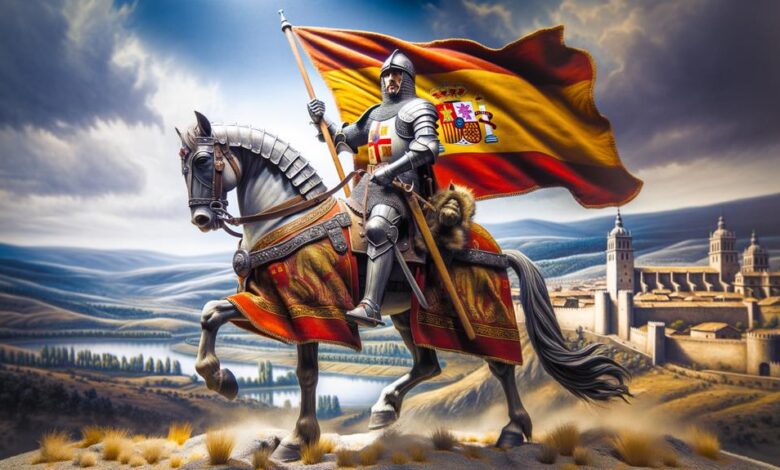El Cid The Legendary Spanish Warrior Who Became a National Hero

Few historical figures have left as lasting an impact on Spanish culture and history as Rodrigo Díaz de Vivar, better known as El Cid. Revered as a military leader, a nobleman, and a symbol of Spanish strength, El Cid’s story is one of bravery, honor, and strategic brilliance. His exploits during the 11th century, especially during the Reconquista, have been immortalized in literature, film, and folklore. In this article, we will delve into the life of El Cid, his legendary battles, and his enduring legacy.
Early Life and Rise to Fame
Rodrigo Díaz de Vivar was born el cid around 1043 AD in the Kingdom of Castile, near the town of Vivar. He belonged to a noble family and received a strong education in combat and military tactics. His early years were spent in the service of King Sancho II of Castile, where he quickly earned a reputation as a skilled warrior.
El Cid’s rise to prominence came during a period of intense conflict between the Christian kingdoms of Spain and the Muslim-ruled regions known as Al-Andalus. His unwavering loyalty to King Sancho II and his victories in battle earned him the title “El Cid Campeador”, which means “The Lord Champion.”
Exile and Service to Muslim Rulers
Despite his successes, political intrigue led to El Cid’s exile after King Sancho II was assassinated in 1072 AD. His successor, King Alfonso VI, distrusted El Cid and banished him from Castile. Rather than fade into obscurity, El Cid turned his exile into an opportunity.
He entered the service of Moorish rulers, particularly the Emir of Zaragoza, offering his military expertise in exchange for wealth and influence. This phase of his life demonstrated his adaptability and tactical prowess, as he fought alongside Muslim armies and against both Christian and Moorish adversaries.
Conquest of Valencia
El Cid’s most famous achievement came in 1094 AD, when he captured the strategic city of Valencia. After a prolonged siege, he took control of the city, establishing himself as an independent ruler. His leadership in Valencia marked the peak of his power, as he ruled the city with a mix of Christian and Muslim influences, showcasing his diplomatic skills.
Under El Cid’s rule, Valencia thrived, and he successfully defended it from repeated attacks by the Almoravids, a powerful North African Muslim dynasty. His ability to unite diverse groups under his leadership was a testament to his remarkable strategic vision.
Death and Immortalization in Legend
El Cid passed away in 1099 AD, leaving behind a legacy that would only grow over the centuries. His wife, Doña Jimena, continued to rule Valencia after his death but ultimately had to abandon it in 1102 AD when the city fell to the Almoravids.
Despite his passing, El Cid’s legend endured, and he became a national hero of Spain. His exploits were celebrated in medieval literature, most notably in the epic poem “El Cantar de Mio Cid”, which glorifies his battles, honor, and unbreakable spirit.
The Myth vs. The Man
As with many legendary figures, the historical El Cid differs somewhat from the myth. While the epic poem portrays him as a purely Christian warrior fighting against the Moors, history reveals a more complex reality. He was a pragmatic leader who fought for both Christian and Muslim rulers, prioritizing strategy and survival over religious conflicts.
Despite this nuance, El Cid remains a symbol of Spanish resilience, embodying the virtues of courage, loyalty, and military genius.
El Cid’s Influence on Spanish Culture
El Cid’s impact on Spanish culture is undeniable. His story has inspired numerous books, operas, and films, including the 1961 Hollywood classic “El Cid”, starring Charlton Heston and Sophia Loren. In Spain, his legacy is preserved in museums, statues, and historical sites such as his tomb in Burgos Cathedral.
Even today, El Cid’s name is synonymous with heroism, and his legacy continues to be a source of pride for Spain.
Conclusion
El Cid’s life is a tale of war, honor, and strategy. From his early days as a noble warrior to his conquest of Valencia and eventual rise to legendary status, he remains one of Spain’s most celebrated historical figures. While the myths surrounding him have grown over time, the essence of his story remains unchanged—a leader who defied the odds, forged his own path, and became an eternal symbol of Spanish greatness.
Whether viewed as a historical figure or a mythical hero, El Cid’s story continues to captivate people around the world, proving that true legends never fade.



